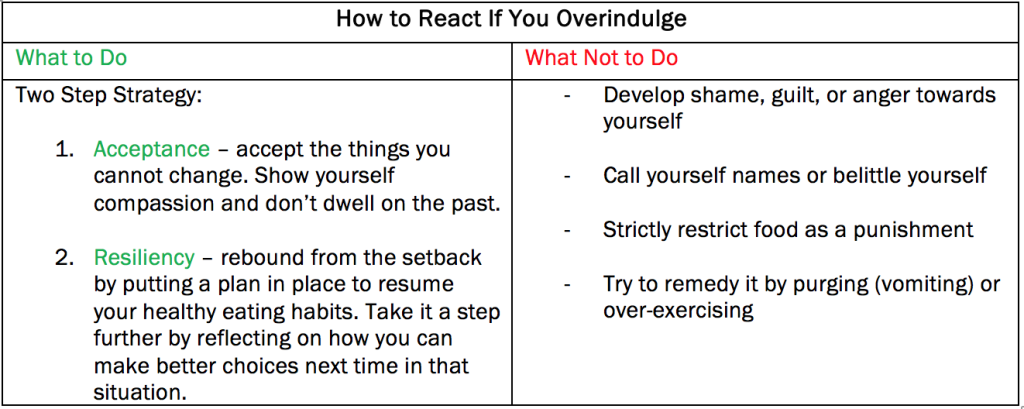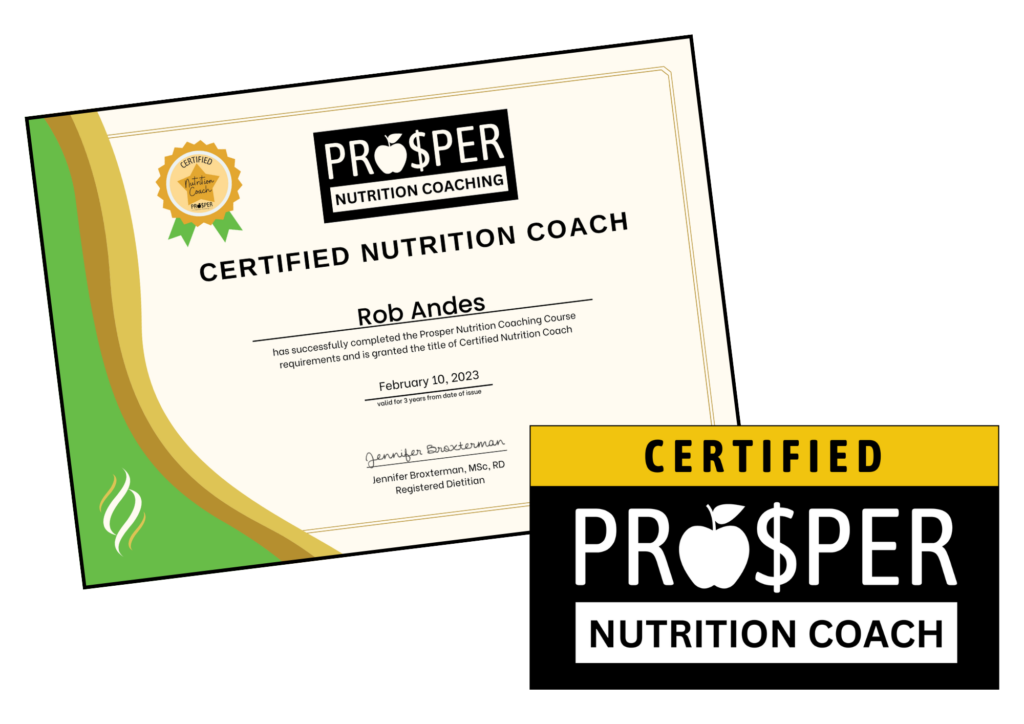

How You May Be Sabotaging Your Weight Loss… And How to Fix It

Can you relate to:
- Feeling guilty, ashamed, or angry at yourself if you overindulge and don’t eat as healthily as you want to?
- Constantly trying to implement healthy eating habits or a diet and then fall off the bandwagon for days or weeks at a time?
- Being stuck in a “rut”, where you want to eat healthy but you can’t seem to convince yourself to start?
- Wondering what’s the point of trying to eat well, because you keep ‘failing’?
Does this sound like you? If so, you aren’t alone. In modern society, weight loss and maintenance is HARD. We are constantly reminded that we are surrounded by delicious things to eat, like the smell of Cinnabon, the ads for fast food joints, and delicious treats in the break room. So of course, we can only resist for so long, until we find ourselves munching on pizza and wine at a friend’s house, at the drive thru after a particularly hard day at work, or in the car with a bag of chips after we’ve gone to the grocery store hungry (been there!).
Now, you may be thinking that this is sounding like an article dedicated to telling you exactly how to avoid these temptations… how to harness your willpower and never overindulge again. For a good reason, it’s not. The reality is that the temptations will always be there, and sometimes when we are tired, sick, sad, or stressed (or all the above), willpower just isn’t enough. Although learning how to manage your eating habits and willpower is important, what I think is the MOST important is how you manage yourself after you’ve overindulged. Can you bounce back? Or are you so consumed with guilt that you tell yourself there’s no point, it’s hopeless, and give up? It is this defining moment that will make or break your weight loss, not the ‘bad’ meal or day that you had.
Here’s why: Your overall consistency with healthy eating will predict your success, not one high calorie meal or day. Let me say it again for the people in the back. The actions and behaviours you perform on a regular basis are much more predictive of the outcome than a couple of meals of overindulgence.
At that moment, you have a choice. You can:
#1) Feel guilty and hopeless, and decide that you’re not ready yet to truly commit to healthy eating and return to your old habits. This choice creates ‘consistent’ unhealthy eating habits.
#2) Accept that you had a little setback and move on. You cut yourself a little slack, and rebound easily back into healthy eating habits. This choice creates ‘consistent’ healthy eating habits.
One of the hardest pieces of weight loss is consistency, where you develop healthy habits that stick for life. The actions that you perform consistently dictate how successful you are going to be in various endeavors. For example, if I wanted to become an Olympic figure skater, it wouldn’t happen if I practised for a few weeks, then decided to take months off at a time. If I wanted to make the Olympics, I’d have to practice day in and day out for years to get good enough. However, this doesn’t mean that if I missed a couple days of practice due to an injury or sickness that it would totally derail my progress. All this means is that in the grand scheme of things, what matters most is practicing the skills as consistently as life will allow us.
This translates SO well into healthy eating. If we have a bad day, a bad weekend, or even a bad week we often feel like failures and decide that we aren’t yet ‘ready’ to eat well. So, we get stuck in a rut, for weeks, months, or years until the guilt is so heavy that we feel the need to do it all over again. But in reality, a few days of not eating well does not mean that we’ve failed, or that we can’t keep practising those healthy eating habits. What is does mean is that we are human, and things happen that are out of our control.
The best thing we can do for ourselves is develop a two-part strategy to help us quickly overcome these setbacks – acceptance and resiliency.

Here’s why acceptance and resiliency are so important:
Imagine you were told in school that you had to get 100% on every assignment, test, and exam. Would you be able to uphold that level of pressure and commitment for years? Likely not. It’s just ludicrous to hold anyone to those standards. However, in healthy eating, we often think of it as an ‘all or nothing’ approach. If we make one ‘bad’ choice then we automatically discredit our ability to eat well and care for ourselves, and feel like total failures.
If this is you, then you are holding yourself to unobtainable standards of perfection. I repeat, unobtainable standards of perfection. Nobody has perfect eating habits. And quite frankly, it would be really boring if someone did. Imagine a life where you can’t enjoy a piece of birthday cake at your child’s birthday party, or where you can’t go out for a couple drinks with your friends, or where you can’t enjoy ice cream on a hot, humid summer day. That doesn’t sound like much of a life to me!
It is crucial to realize that you will never be perfect, and this is where this strategy comes into play.
First, you need stop being so hard on yourself if you have an off day, or week. These things happen, and we can’t control every aspect of our life. This is very important because once we start feeling guilty or ashamed of our behaviour, it can negatively alter the way we see ourselves. Once we start constantly berating ourselves for our behaviour, then in turn we start telling ourselves that we are a failure, unworthy, or maybe even lazy. These negative perceptions are SO damaging, not only to our mental well-being but also because they will start dictating how we feel throughout the day. If you are always telling yourself you’re a failure, or that you are ugly or disgusting or unworthy, then you may find you become sad, depressed, or angry. These emotions on a regular basis can make you a very unhappy person. This unhappy person is much less likely to be successful in maintaining healthy habits, because they are sad and feeling hopeless. On the other hand, a person who is happy, upbeat, and positive is more likely to have the will and energy to go and prep some healthy snacks, or head out to the gym with a friend for a good workout.
So, next time you have a bad day, or week, show yourself some compassion. Give yourself permission to make mistakes and let go of the idea that you need to be perfect. Trust that one night or weekend of binging on your favourite foods doesn’t mean you are a failure, it means you are a human and you want to enjoy your life. Instead of focusing on the negative, ask yourself what you could do differently next time to eat a little better. Create a plan for the next time you may find yourself in that situation so you are happier with your choices.
For example, let’s say you had to work late on a Friday before you met up with your friends or family at a restaurant. You were ravenous by the time you got to the restaurant, so instead of getting the healthier option you had planned on, you got an appetizer, ate some of the bread, had a huge portion of pizza and then capped it off with a dessert. Instead of going home and feeling terrible about it, you show yourself some self-compassion. You know you can’t hop in a time machine and change what happened, all you can do is try to do better next time. The next morning, you jump right back into your healthy habits and eat a healthy, well-balanced breakfast. You also want to prevent this scenario from occurring a second time, so you start keeping a couple of small bags of trail mix in your desk drawer at work. So if you have to work late, you have something to eat that will prevent you from being really hungry next time, which may mean you skip the bread, appetizer, and dessert, and just have a couple slices of pizza with a side salad. This is resiliency – overcoming the inevitable obstacles that you will experience over the course of your life.
Client Story
One of my clients particularly stands out to me that was able to develop incredible resiliency throughout our time together.
She was a university student majoring in two specialties. Her weekdays were usually packed full of class, group meetings, and extracurricular activities (she also was part of a couple student clubs). This translated into more than 60 hours of school per week! She often would have to be at the school for 8:30am and would only go home for a couple hours to eat dinner. After dinner, she would go back to the school and continue working until 10:30 or 11:00pm at night. Her weekends also consisted of group meetings, homework to catch up from the previous week, and running errands.
When we initially met, she knew the importance of eating, but barely gave herself enough time to do so. Her lunch and dinner were especially rushed and were often purchased from the school cafeteria. She wanted to eat healthy more consistently, but would constantly get caught up the chaos of her schedule and get into a ‘rut’. If she had a particularly hectic couple of days, she would revert into eating take out and then feel guilty for making those choices.
I wish I could have waved a magic wand and either given her less responsibilities or more time in the day. Sadly, I don’t have those powers, so we had to settle on some realistic goals. In her case, the reality of her situation is that at least while she is in school, she won’t have perfect eating habits, and that’s okay. What matters most is what you do consistently, so we discussed healthy habits that worked for her life and schedule to help her eat as best as possible.
We discussed the fact that perfection with her eating habits just wasn’t feasible, especially while she is in school. As a team, we decided realistically what her best effort looked like, which took into consideration her schedule and commitments. From there, we talked about giving herself permission to eat less healthy food during those chaotic times when necessary.
- We came up with some quick and easy snack and meal options for her to make on Sundays.
- We talked about what healthy foods she could take with her while she was travelling for conferences and family vacations.
- We discussed the healthy plate model, so she could do her best to eat healthy during the holidays, at buffets at conferences, while travelling, at restaurants, etc.
- We discussed healthier fast food options for those days when she had no choice but to eat out, because of her school schedule.
From there, it was incredible to see her transformation over the course of our five appointments.
Here’s some highlights of the incredible things that happened:
- She starting taking 20 minutes on the weekends to prep some snacks to bring with her to school
- She picked 1-2 recipes that she could make in an hour on the weekend to have as lunch or dinner for the week
- She felt more confident with her food choices, and dramatically reduced the amount of time she spent worrying about what she was eating during the day
- If she had an off day, she didn’t spend too much time feeling guilty about it or get stuck in a “bad eating rut” for more than 1-2 days, and when she was able to, jumped right back into healthy eating
- While she was in exams, the most stressful time for university students, a setback wiped out her ability to use her kitchen. So instead of reverting into old habits and eating fast food all week, she did her best to make healthier choices while eating out, and enlisted the help of friend, who let her use her kitchen so she could do a couple hours of meal and snack prep.
We have to realize that doing the best we can is enough. Eating well 80-85% of the time is still going to help you get the results you want. Giving yourself permission to have some off days doesn’t mean that you are a failure, or that you were “bad”, it just means you are human and that you aren’t perfect. Nobody is.
This client is a perfect example of how we work with you here at NutritionRx to develop resiliency, and I think she is a shining star example of how incredibly valuable it is to develop this trait. Instead of spending your energy on self-destructive habits like shame, guilt, and frustration, we want to teach you how to rebound from a setback like a champion. We will help you instill healthy habits consistently into your life, so the majority of choices are really healthy, positive ones. Then, when you inevitably have some off days, or challenges, you can easily handle them without ‘falling off the wagon’.
If you feel like you could really benefit from our help, we would love to have you as a client. The best way to get started is reach out to us at info@nutritionrx.ca. We hope that investing in your health and well-being is one of the best investments you’ll ever make.
Wishing you health & happiness,
♡ Jen
Jennifer Broxterman, MSc, RD
Registered Dietitian
NutritionRx: happy, healthy living with our team of Registered Dietitians
Prosper Nutrition Coaching: a world-class nutrition coaching certification
+
+
+
Want to work with a NutritionRx Registered Dietitian?
Learn more here: Nutrition Packages & Rates
+
+
+
Want to become a Certified Nutrition Coach?
Learn more about our habits-based Prosper Nutrition Certification



